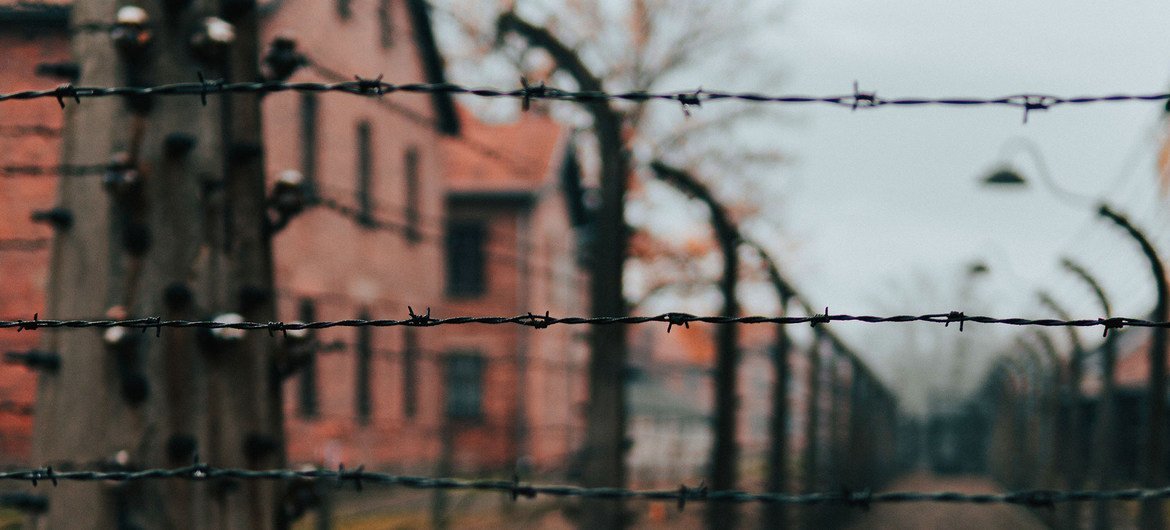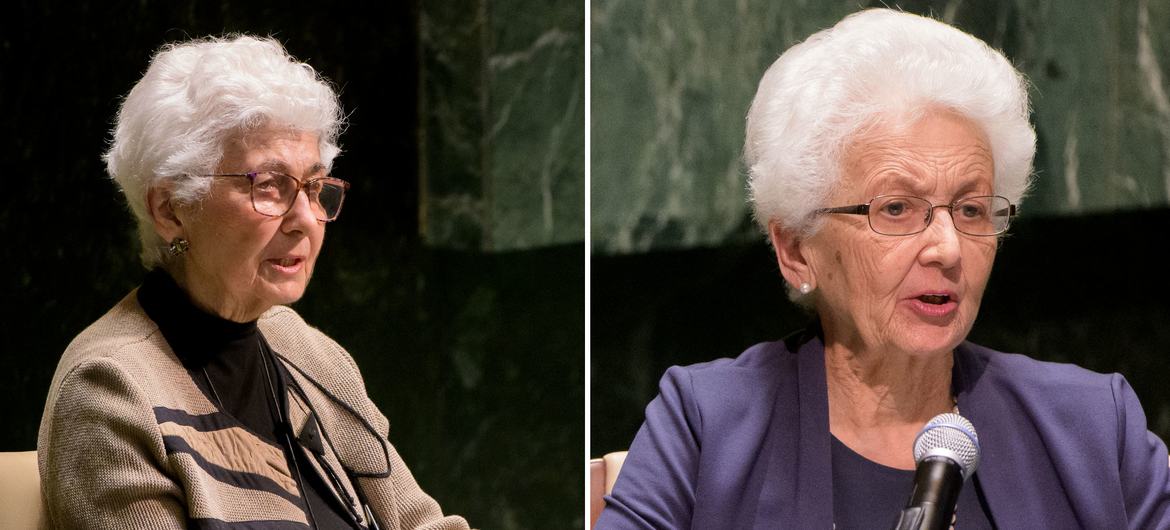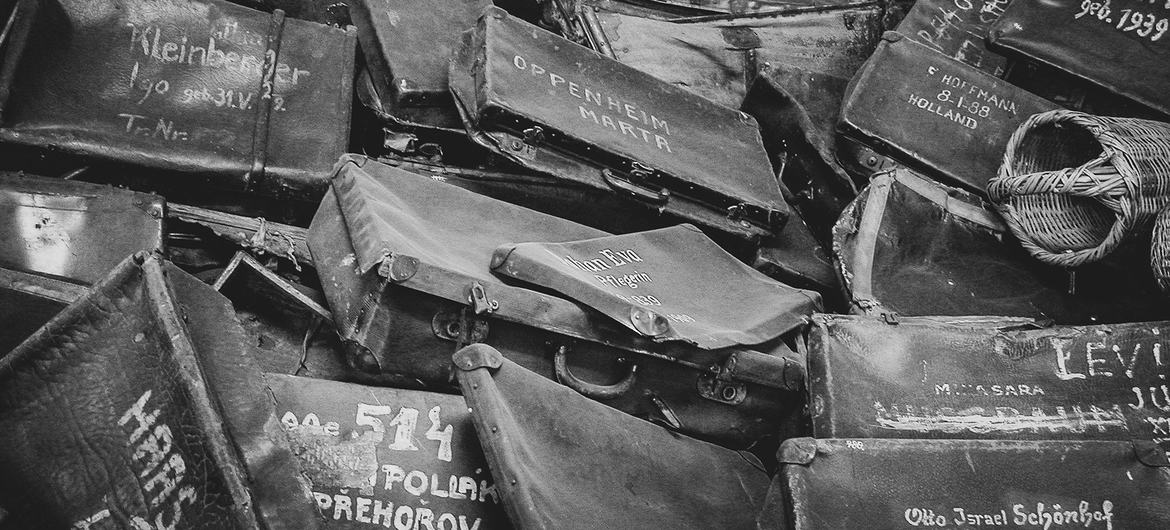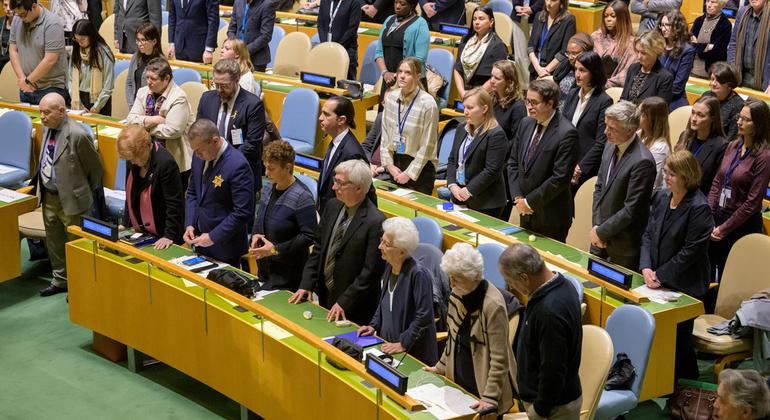“All of us – leaders and citizens – have a responsibility to listen and to learn from survivors and victims by condemning these terrible crimes against humanity, striving to eradicate antisemitism and all forms of bigotry, hatred and intolerance and by finding a way forward to a shared, safe and inclusive future for all,” UN chief António Guterres said.
“This is particularly important in today’s dangerous and divided world, and a few short months after Hamas’ horrific terror attacks, in which so many innocent Israeli civilians and citizens of other countries were killed,” he said.
Marking the annual International Day of Commemoration in memory of the victims of the Holocaust, observed on 27 January, the ceremony focused on the theme of recognizing the extraordinary courage of victims and survivors.
‘Never let down our guard’
The world must resolve to “stand up against the forces of hate and division”, he continued.
The antisemitic hate that fuelled the Holocaust did not start with the Nazis nor did it end with their defeat, he said, but was preceded by thousands of years of discrimination, expulsion, exile and extermination.
“Today, we are witnessing hate spreading at alarming speed,” the UN chief said. “Online, it has moved from the margins to the mainstream.”
To combat hate, he urged all to speak out.
“Let us never be silent in the face of discrimination, and never tolerant of intolerance,” he said. “Let us speak out for human rights and the dignity of all. Let us never lose sight of each other’s humanity, and never let down our guard.”
‘You are not alone’
In addition to its Outreach Programme on the Holocaust, the UN Strategy and Plan of Action on Hate Speech sets out strategic guidance at national and global levels.
“To all who confront prejudice and persecution, let us clearly say: you are not alone,” Mr. Guterres said. “The United Nations stands with you.”
“Today, of all days, we must remember that demonization of the other and disdain for diversity is a danger to everyone. that no society is immune to intolerance and worse and that bigotry against one group is bigotry against all.”

The former Auschwitz-Birkenau concentration camp in southern Poland.
Survivors’ stories are powerful reminders for vigilance: PGA
Dennis Francis, President of the General Assembly, said, in a pre-recorded video message, that promoting remembrance and education regarding the Holocaust is essential to ensuring that the crime of genocide is never seen as either normal or justifiable in any circumstance and to work towards ensuring it is never repeated.
“Today, those who tragically perished and the survivors are the powerful force behind all we do at the United Nations to save succeeding generations from the scourge of war, to promote and defend human rights and to work relentlessly for a more just and peaceful world,” he said.
The stories of victims and survivors are the reminders of “our duty to counter hatred and intolerance” amid a surge in hate speech across the world, with rising antisemitism and xenophobia.
“We cannot and must not be complacent,” he said. “Today and every day, we must recommit to say more than just ‘never again’. We must live our lives daily by this mantra. The Holocaust must forever be a warning to all of us to stay vigilant against widespread hatred, racism, prejudice and intolerance.”

Sisters Selma Tennenbaum Rossen and Edith Tennenbaum Shapiro, survivors from Poland, address the UN Holocaust Memorial Ceremony, held in observance of the International Day of Commemoration in memory of the victims.
‘Never again is now’: Israel
Israel’s Ambassador Gilad Erdan said the attack on Israel on 7 October by Hamas was “an attempted genocide”.
“We, the Jewish people, understand the meaning of genocide more than any other people,” he said. “We have been persecuted for millennia. Hitler seared the meaning of genocide into our DNA.”
But, on 7 October, Hamas “tore open that wound”, he said, patting a yellow star, a badge the Nazi regime forced Jewish people to wear, affixed to his lapel.
“On International Holocaust Remembrance Day…I stand here, in the name of the State of Israel, in the name of all those murdered by the Nazis and Hamas, and I swear, we will not forget. Never again is now.”

Suitcases and bags confiscated from prisoners at a concentration camp in Auschwitz, Poland.
Dehumanization enabled the Holocaust
In a statement commemorating the international day, Volker Türk, UN High Commissioner for Human Rights (OHCHR), said the world is duty-bound to examine why the Holocaust happened to ensure it is never repeated.
Indeed, the scale of the crimes committed engaged many perpetrators, he stressed.
The Nazi concentration camps and death trains were staffed, and the victims had often been identified to the police, by people they knew, he said.
“Countless bystanders looked away from – or were indifferent to – what they must have suspected was extraordinary, inhuman brutality,” he said. “The dehumanization that enabled the Holocaust – the depth and scale of this failure of empathy and fellow feeling for other human beings – is incomprehensible and terrifying.”
The world’s horror at the Holocaust led directly to the adoption of the Genocide Convention and to the Universal Declaration of Human Rights 75 years ago and instrumental in the adoption of the European Convention on Human Rights and a host of international treaties that enshrine equality, dignity and rights in the face of tyranny and destitution, he said, adding that these are conventions and principles and values that must forever be upheld.
“It is our duty to seek answers to how these crimes could have been prevented,” he said. “If we do not, they could happen again.”
UN Holocaust Memorial Ceremony
This year’s ceremony was hosted by Melissa Fleming, Under-Secretary-General for Global Communications, and featured a range of speakers, testimonies from survivors and performances.
- Speakers included the UN Secretary-General, President of the 78th session of the General Assembly, Permanent Representative of Israel and the United States Special Envoy to Monitor and Combat Antisemitism.
- Holocaust survivor Christian Pfeil, who was born in the Lubin ghetto in occupied Poland, shared his testimony about the persecution of the Roma and Sinti people.
- Sisters Edith Tennenbaum Shapiro and Selma Tennenbaum Rossen, Holocaust survivors from Poland, shared their stories alongside a performance by violinist Doori Na.
- Others who contributed to the event included Patra and Patrik Gelbart, who sang a piece about the Roma people. Cantor Daniel Singer recited a memorial prayer.
- The ceremony is available on UN WebTV here.



